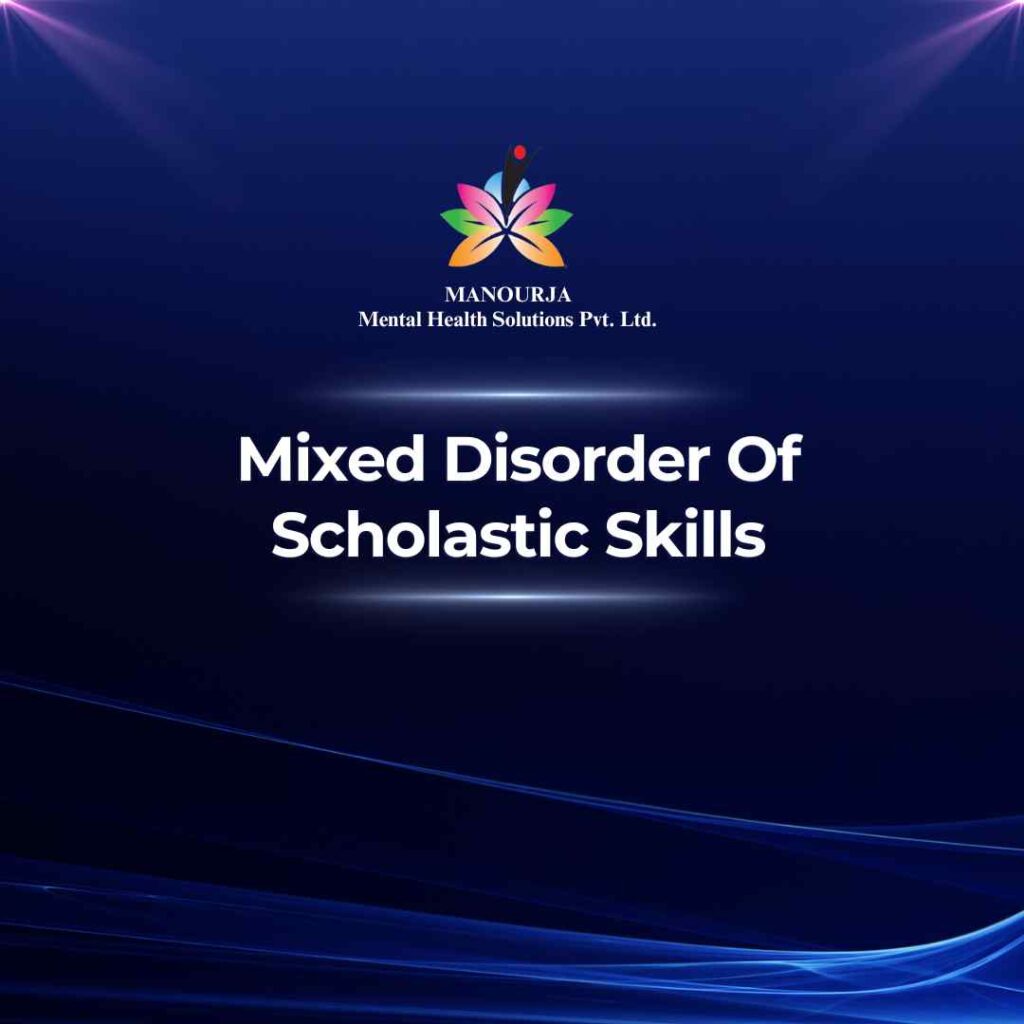Mixed Disorder of Scholastic Skills

Mixed Disorder of Scholastic Skills is a learning disability that involves significant impairments in two or more areas of learning, typically affecting a combination of reading, writing, and arithmetic skills. This disorder is characterized by difficulties that are substantially below what is expected for a person’s age, level of education, and measured intelligence, and these difficulties are not due to generalized intellectual disability or inadequate schooling.
Symptoms of Mixed Disorder of Scholastic Skills
The characteristics of Mixed Disorder of Scholastic Skills include a combination of symptoms from disorders like dyslexia, dysgraphia, and dyscalculia. Common features might include:
- Reading Difficulties: Problems with word recognition, poor reading comprehension, and difficulties in reading speed and fluency.
- Writing Challenges: Issues with spelling, poor handwriting, trouble composing written texts, and difficulties with grammar and punctuation.
- Mathematical Struggles: Problems understanding basic math concepts, difficulty performing calculations, and challenges in solving mathematical problems.
Individuals with this disorder often perform poorly in academic settings, struggle with homework and tests, and may display avoidance behaviors towards school and learning tasks due to their frustrations.
Forms of Mixed Disorder of Scholastic Skills
Mixed Disorder of Scholastic Skills does not refer to a specific form or category within learning disabilities but rather encompasses multiple learning difficulties. It varies significantly among affected individuals, depending on which areas of learning are most impacted. Some may have more pronounced difficulties with math and reading, while others might struggle more with writing and math, etc.
Treatment of Mixed Disorder of Scholastic Skills
Treatment and intervention for Mixed Disorder of Scholastic Skills are interdisciplinary and tailored to address each individual’s unique combination of challenges. Effective strategies include:
Individualized Education Programs (IEPs):
These are specialized educational plans developed for school-aged children that outline specific goals and the types of interventions that will be implemented to help the child succeed academically.
Specialized Tutoring:
Targeted help outside of regular class hours can focus on specific areas such as reading, writing, or math. Tutors trained in specific learning disabilities can provide substantial support.
Multisensory Instruction Techniques:
These instructional methods engage more than one sense at a time, helping to reinforce learning through multiple modalities. For example, using visual aids, auditory lessons, and tactile activities together can enhance understanding and retention.
Use of Technology:
Assistive technology, including software that supports reading, writing, and arithmetic, can compensate for areas of weakness. Tools like text-to-speech and speech-to-text programs, electronic math worksheets, and graphic organizers can be very helpful.
Therapeutic Support:
Psychological support to address associated emotional and behavioral issues such as low self-esteem, anxiety, or depression often seen in children with learning disabilities. Counseling can help children develop coping strategies to manage their frustrations and challenges.
Skills Training:
Explicit instruction in organizational skills, study skills, and time management can benefit children with learning disabilities by helping them become more efficient learners.
Accommodations in Testing and Assessment:
Modifications in the way tests are administered, such as allowing extra time, providing quieter settings, or using alternative formats (oral instead of written), can help students demonstrate their true capabilities.
Conclusion
Mixed Disorder of Scholastic Skills requires a comprehensive, customized approach that addresses multiple aspects of learning difficulties simultaneously. With the right combination of educational strategies, technological aids, and therapeutic interventions, individuals with this disorder can significantly improve their academic skills and overall educational outcome. Early diagnosis and intervention are crucial in helping these individuals achieve their potential.
At MANOURJA, we believe in the transformative power of counseling. Our experienced therapists offer a safe and supportive space where you can explore your thoughts, emotions, and challenges. Through personalized counselling sessions, we’ll work together to develop coping strategies, build resilience, and achieve lasting positive change. Discover the path to a healthier, happier you with MANOURJA counselling services.
MANOURJA Rehabilitation Services
At MANOURJA, we’re dedicated to helping you in rebuild your life, after difficult times. Our rehabilitation services focus on understanding what you need to move forward, whether you’re recovering from addiction, trauma, or any psychological – social challenges. We create personalized plans, that are all about helping you, regain your strength and find hope again. With a caring team by your side, you’ll have the support to make real progress and take steps toward a brighter, healthier future.
